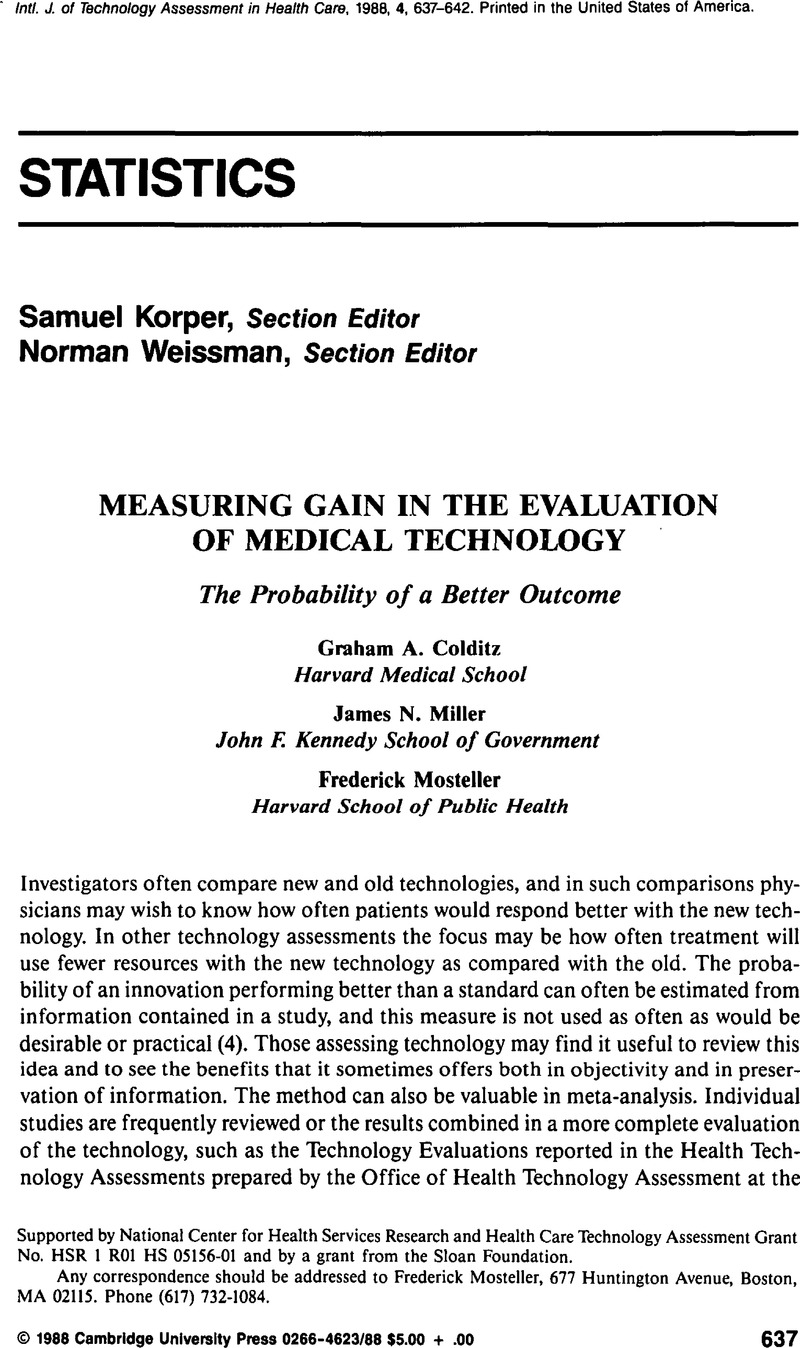Crossref Citations
This article has been cited by the following publications. This list is generated based on data provided by Crossref.
Colditz, Graham A.
Miller, James N.
and
Mosteller, Frederick
1989.
How study design affects outcomes in comparisons of therapy. I: Medical.
Statistics in Medicine,
Vol. 8,
Issue. 4,
p.
441.
Laird, Nan M.
and
Mosteller, Frederick
1990.
Some Statistical Methods for Combining Experimental Results.
International Journal of Technology Assessment in Health Care,
Vol. 6,
Issue. 1,
p.
5.
Rahlfs, Volker W.
and
Zimmermann, Helmuth
1993.
Scores: Ordinal Data with Few Categories—How Should They Be Analyzed?.
Drug Information Journal,
Vol. 27,
Issue. 4,
p.
1227.
Rahlfs, Volker W.
1996.
Reevaluation of Some Double‐Blind, Randomized Studies of Dexibuprofen (Seractil): A State‐of‐the‐Art Overview: Studies in Patients with Lumbar Vertebral Column Syndrome, Rheumatoid Arthritis, Distortion of the Ankle Joint, Gonarthrosis, Ankylosing Spondylitis, and Activated Coxarthrosis.
The Journal of Clinical Pharmacology,
Vol. 36,
Issue. S12,
Wober, W
Rahlfs, VW
Büchl, N
Grässle, A
and
Macciocchi, A
1998.
COMPARATIVE EFFICACY AND SAFETY OF THE NONSTEROIDAL ANTI‐INFLAMMATORY DRUGS NIMESULIDE AND DICLOFENAC IN PATIENTS WITH ACUTE SUBDELTOID BURSITIS AND BICIPITAL TENDINITIS.
International Journal of Clinical Practice,
Vol. 52,
Issue. 3,
p.
169.
Farkas, B
Dobozy, A
Horváth, A
Hunyadi, J
and
Schneider, I
1999.
Comparison of tacalcitol ointment with short-contact dithranol therapy in the treatment of psoriasis vulgaris: a randomized multicentre, open prospective study on efficacy and safety.
Journal of Dermatological Treatment,
Vol. 10,
Issue. 2,
p.
93.
Niederau, Claus
and
Göpfert, Ernst
1999.
Die Wirkung von Schöllkraut- und Curcumawurzelstock-Extrakt auf Oberbauchbeschwerden infolge funktioneller Störungen des ableitenden Gallensystems.
Medizinische Klinik,
Vol. 94,
Issue. 8,
p.
425.
Huskisson, Edward C.
Macciocchi, Alberto
Rahlfs, Volker W.
Bernstein, Robert M.
Bremner, Archibald D.
Doyle, David V.
Molloy, Michael G.
and
Burton, Albert E.
1999.
Nimesulide versus diclofenac in the treatment of osteoarthritis of the hip or knee: An active controlled equivalence study.
Current Therapeutic Research,
Vol. 60,
Issue. 5,
p.
253.
Faraone, Stephen V.
Biederman, Joseph
Spencer, Thomas J.
and
Wilens, Timothy E.
2000.
The Drug-Placebo Response Curve: A New Method for Assessing Drug Effects in Clinical Trials.
Journal of Clinical Psychopharmacology,
Vol. 20,
Issue. 6,
p.
673.
Rahlfs, Volker W.
2000.
Cutaneous Biometrics.
p.
3.
Tieffenberg, J. A.
Wood, E. I.
Alonso, A.
Tossutti, M. S.
and
Vicente, M. F.
2000.
A randomized field trial of acindes: A child-centered training model for children with chronic illnesses (asthma and epilepsy).
Journal of Urban Health,
Vol. 77,
Issue. 2,
p.
280.
Huber, M
Krauter, K
Winkelmann, G
Bauer, H.W
Rahlfs, V.W
Lauener, P.A
Bleßmann, G.S.S
and
Bessler, W.G
2000.
Immunostimulation by bacterial components: II. Efficacy studies and meta-analysis of the bacterial extract OM-89.
International Journal of Immunopharmacology,
Vol. 22,
Issue. 12,
p.
1103.
Moran, J.L.
and
Peake, S.L.
2001.
Further reflections on clinical trials in critical care.
Critical Care and Resuscitation,
Vol. 3,
Issue. 4,
p.
226.
Grissom, Robert J.
and
Kim, John J.
2001.
Review of assumptions and problems in the appropriate conceptualization of effect size..
Psychological Methods,
Vol. 6,
Issue. 2,
p.
135.
Liske, E.
Hänggi, W.
Henneicke-von Zepelin, H.-H.
Boblitz, N.
Wüstenberg, P.
and
Rahlfs, V.W.
2002.
Physiological Investigation of a Unique Extract of Black Cohosh (Cimicifugae racemosae rhizoma): A 6-Month Clinical Study Demonstrates No Systemic Estrogenic Effect.
Journal of Women's Health & Gender-Based Medicine,
Vol. 11,
Issue. 2,
p.
163.
Bauer, Hartwig Wilhelm
Rahlfs, Volker W
Lauener, Pierre A
and
Bleßmann, Gabriela S.S
2002.
Prevention of recurrent urinary tract infections with immuno-active E. coli fractions: a meta-analysis of five placebo-controlled double-blind studies.
International Journal of Antimicrobial Agents,
Vol. 19,
Issue. 6,
p.
451.
Kerkhoffs, G M M J
Struijs, P A A
de Wit, C
Rahlfs, V W
Zwipp, H
and
van Dijk, C N
2004.
A double blind, randomised, parallel group study on the efficacy and safety of treating acute lateral ankle sprain with oral hydrolytic enzymes.
British Journal of Sports Medicine,
Vol. 38,
Issue. 4,
p.
431.
Akhtar, Naseer M.
Naseer, Rizwan
Farooqi, Abid Z.
Aziz, Wajahat
and
Nazir, Mussadeq
2004.
Oral enzyme combination versus diclofenac in the treatment of osteoarthritis of the knee ? a double-blind prospective randomized study.
Clinical Rheumatology,
Vol. 23,
Issue. 5,
p.
410.
Müller, Thomas
Mannel, Marcus
Murck, Harald
and
Rahlfs, Volker W.
2004.
Treatment of Somatoform Disorders With St. Johnʼs Wort: A Randomized, Double-Blind and Placebo-Controlled Trial.
Psychosomatic Medicine,
Vol. 66,
Issue. 4,
p.
538.
Madisch, A.
Holtmann, G.
Plein, K.
and
Hotz, J.
2004.
Treatment of irritable bowel syndrome with herbal preparations: results of a double‐blind, randomized, placebo‐controlled, multi‐centre trial.
Alimentary Pharmacology & Therapeutics,
Vol. 19,
Issue. 3,
p.
271.



